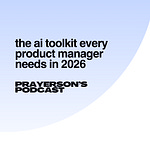in this conversation, you’ll learn:
how ai has shifted from a roadmap feature to being baked into almost every digital product.
why pm’s now face a foundational crisis: speed, amplification, and ethical responsibility.
the challenges of designing ai products that are both delightful and socially responsible.
practical lessons from real-world examples like wellness bots and hiring ai tools.
where to find prayerson:
in this episode, we cover:
(00:00 - 0:44) ai’s new reality
ai is no longer a distant feature; it’s embedded in digital infrastructure.
it amplifies decisions, speed, reach, and unintended consequences beyond human oversight.
(0:44 - 1:27) delta 4 thinking and pm responsibility
every product release must responsibly reshape user behavior.
pm’s now balance delight, speed, and ethical accountability with serious legal and societal stakes.
(1:27 - 3:16) the pitfalls of wellness bots
hyper-optimized engagement can ignore real human stress, creating surveillance experiences.
gamified metrics and nudges can backfire if they don’t respect actual user context.
(3:16 - 5:15) amplifying problems vs. responsible design
ai tools can unintentionally exacerbate issues if they ignore human limits.
pm’s must engineer for empathy, not just engagement or adoption metrics.
(5:16 - 7:44) hiring ai and structural bias
ai can automate historical biases, as seen in the amazon recruiting case.
pm focus shifts to scrutinizing input data, process integrity, and ethical oversight.
(7:44 - 10:16) regulation and high-stakes ai
compliance now drives product design, not just legal review post-launch.
eu ai act introduces strict requirements for transparency, governance, and ongoing human oversight.
(10:17 - 12:42) friction, absurdity, and the ethical masquerade
automation can produce absurd outputs when safety logic clashes with user context.
checklists and fairness frameworks are necessary but insufficient without continuous human judgment.
(12:42 - 15:17) trust as infrastructure
trust gaps emerge when delight outpaces verifiable reliability in ai products.
pm’s must focus on clarity, predictability, and accountability to maintain trust.
(15:18 - 17:47) accountability as a product requirement
product goals now combine delight, adoption, and ethical rigor.
pm’s must build transparent feedback loops, data logging, and oversight into every ai feature.
every ai output has societal impact—reshaping work, wellbeing, and hiring practices.
(17:55 - 18:19) final provocation
with delta 4 thinking, accountability may be the highest metric to track.
listeners are asked to consider their first crucial ethical safeguard before launching high-stakes ai.









